
One year ago, on February 2nd, 2017, Maki Sudjonga and his sister, Charlotte, received word that their little brother would be one of the lucky ones: he had boarded a plane and was on his way to join them in Boise, Idaho, amidst the chaos of the Trump Administration’s first Travel Ban.
Bahati, Maki, and Charlotte fled the Democratic Republic of Congo after losing their parents in 2005, living in a refugee camp in Uganda for over 10 years. Charlotte and Maki received word that they would be resettled in the U.S. in the fall of 2016, but had been separated from Bahati during the process.
Between Maki and Charlotte’s arrival in September, and Bahati’s travel slated for February, much had changed for the state of refugee resettlement in the U.S. Donald Trump was elected President of the United States, and one week after his inauguration, on January 27th, 2017, President Trump signed the first executive order suspending refugee resettlement banning travel from certain countries. It would later become known as, the “Muslim Ban.”

Protests grew at airports across the country, and in Boise, families of refugees scheduled to travel waited desperately for news. For days, the question of Bahati’s capacity to travel or to pass customs into the U.S. was uncertain. Word finally trickled through that Bahati would be one of the last (if not the last) refugee allowed to enter the U.S. before President Trump’s Travel Ban took effect.
On that evening of February 2nd, at the Boise Airport, a mass of over 100 people collected to welcome Bahati: the entirety of IRC’s Boise office, reporters from the Washington Street Journal and a cadre of other news outlets, over 100 members of the Boise community, and of course, Maki Sudjonga and Charlotte Borive.
When Bahati’s lone figure came into view through the airport gates, dazedly swinging his IOM bag, the crowd erupted into cheers and Maki, Charlotte, and members of the refugee community rushed to embrace him, picking him up and placing him on their shoulders.
Faith leaders came together to thank and bless Bahati’s arrival; Boise Mayor Dave Bieter presented Bahati with a signed copy of Boise’s “Welcoming City Proclamation,” and Bahati tried to shake the hands of every stranger who had come to welcome him to his new home. When asked what he wanted, now that he was here, Bahati stated: “My dream is to become a U.S. citizen, for this is my home now.”
One year later, and Bahati is a junior at a local high school, and speaking English fluently despite arriving with no knowledge of the language. He loves all his classes, riding his bicycle, and is looking for a job now that he has settled in with his studies. In the wake of all that has happened in refugee resettlement in the past year, the staff at the IRC in Boise often reflect on this particular arrival: on the joy Bahati brought his family upon their reunification, on all he affects in his classroom every day, on the contributions he will make as a hardworking employee to the economy, and on the voting citizen he will one day become.
In Swahili, “Bahati” means “lucky,” and all of Boise thought he was magically, incredibly lucky to have made it through those arrival gates only a day before they would have been shut to him – and shut they were to so many others. But what the IRC, and Boise’s wider community also came to realize, was how lucky they were to have gained him as a resident, as a student, as a future coworker, as a future citizen.